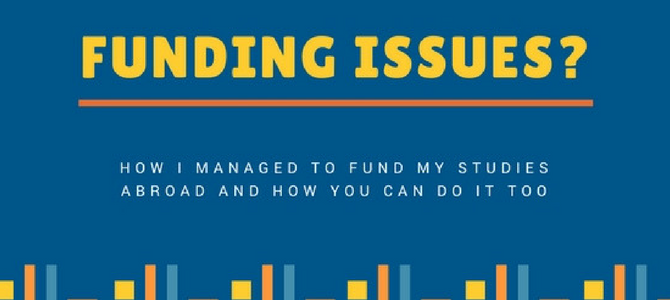Liliana, our Mexican Ambassador, shares how she funded her dream to study abroad and become an international student at Dublin City University…
I had always dreamed of studying abroad. The idea of living in another country, meeting new people and learning from a different culture, is something really exciting for me. It’s a once in a lifetime experience but it can also be very expensive, especially if you pursue studies at postgraduate level.
There are a number of scholarships and diverse programmes that provide students with financial support; the problem is that sometimes, the number of applicants exceeds the number of scholarships available. At some stage, I even thought that I would never be able to do it as it seemed something that was beyond my possibilities.
I know it sounds a bit dramatic, but I was feeling very discouraged. I got over this challenge and decided to get down to business and start looking at all the options that were available to me.
And here it is! A compiled a list of the steps I followed and some additional tips.
- Apply to at least three institutions. It is important that you get at least one offer. I used to think that before even applying to any college, I needed the money to pay the fees upfront, but then I found out that the chances of being granted a scholarship or any kind of financial support increase once you are offered a place on a course.
- Approach a government institution in your country that is in charge of promoting postgraduate studies or education in general. In my country, the National Bank administers a federal trust which provides financial support to postgraduate It was a laborious process, and I had to compete with a significant number of applicants; however, I succeeded by demonstrating that I was really determined to study a master’s degree. I also had to fulfil all the requirements that they asked for. The advantage of getting this type of support is that you won’t have to worry about paying instalments along the duration of your studies and being a government funded financial aid, the interest rates are very low and the fees are accessible.
- Look into the available scholarships in the country you want to study. I previously mentioned that scholarships are difficult to get but, they are worth the try. If there aren’t many options in your home country, you can check what is available in the country where you want to study. Ireland has a broad variety of scholarships, in different areas and for different countries. You can find more information on the Education in Ireland website.
- Private institutions or banks are also an option to get a student loan. Usually, scholarships are granted to pay tuition fees; however, other expenses must be covered when studying abroad, for instance, flight tickets, visa fees, medical insurance, etc. Therefore, getting an extra loan is sometimes advisable; the terms and conditions differ slightly from those of government institutions but being for students, they are still quite accessible.
- Save money. Although there is an extensive range of options available to fund your studies, it never hurts to have your own savings because when you study abroad, you will be asked to have sufficient funds in your personal account to support yourself during your period of study. In Ireland, and depending on your home country, there are specific requirements that you must meet in order to study. Find more information on the INIS website.
So there you go, it is not that complicated, but you need to work hard and be determined to achieve your goal. Studying abroad requires effort and commitment, but once you get there, the experience and the satisfaction it gives you are worth it.

